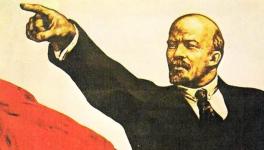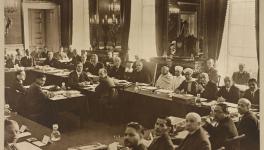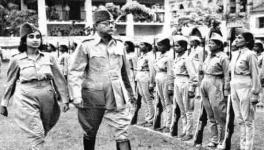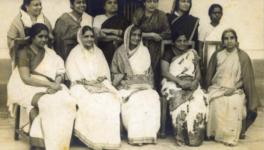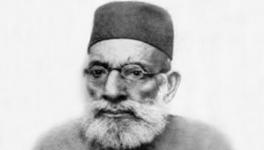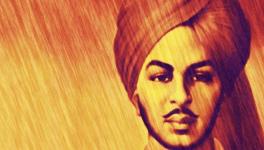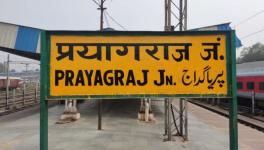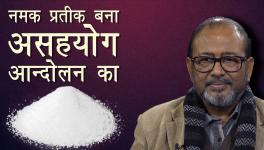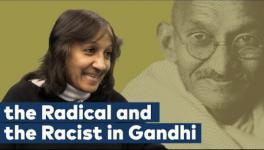Hasrat Mohani: Remembering a Freedom Fighter, Communist and a Muslim
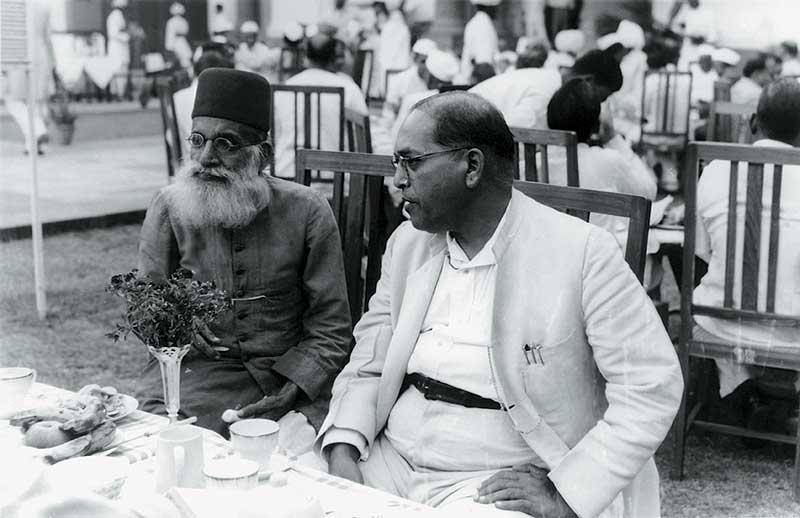
This October 4 marks the 143rd Birth Anniversary of freedom fighter, poet and academic Hasrat Mohani. Even though Mohani’s name is associated with many ‘firsts’ in the Indian Independence movement, he remains till date, one of the most marginalised names in the list of heroes of the Indian freedom movement and is markedly absent from popular Indian consciousness.
It was Mohani who coined the immortal slogan of Indian Revolution ‘Inqilaab Zindabad’ in 1921, which was later popularised by Bhagat Singh and his comrades. Along with Swami Kumaranand -- another important name in Indian communist movement -- Hasrat Mohani was the first person to demand ‘Complete Independence’ or ‘Poorna Swaraj’ for India at the Ahmedabad session of the Indian National Congress in 1921, which was also attended by Ramprasad Bismil and Ashfaqullah Khan (both played an important role in passing the resolution in the general body of INC). He was the chairman of the reception committee of first Indian communist conference which was held on December 25, 1925, and was also a member of the drafting committee of Indian Constitution lead by Dr. B R Ambedkar.
Fazlul Hasan aka Maulana Hasrat Mohani was born in 1881, in a small village named ‘Mohan’; in Unnao district of contemporary Uttar Pradesh. He received elementary education in his village and was later admitted to Government Middle school of Mohan and later in Government High School in Fathepur. This was the time when he developed an interest in Urdu poetry and adopted the pen name ‘Hasrat Mohani’ (Mohani derived from the name of the village where he was born). The famous ghazal ‘Chupke Chupke Raat Din’ has been penned by him.
Mohani was a brilliant student in his high school days (he cracked two entrance examination held at two places and topped both). His academic brilliance was recognised by one Sir Ziauddin of Aligarh who saw his record in the Aligarh Institute Gazette and summoned him to Aligarh where he took admission in MAO College, today known as Aligarh Muslim University. He later started his own journal ‘Urdu-i Mualla’ from Lucknow and newspaper ‘Mustaqil’ from Kanpur. In his later life, Mohani also wrote a commentary on the poetry of Mirza Ghalib titled ‘Sharh-e-Kalam-e-Ghalib’ (explanation of Ghalib's poetry) and a commentary on the nature of poetry itself titled ‘Nukaat-e-Sukhan’ (important aspects of poetry).
The political career of Mohani was nothing short of an Odyssey. After completing his studies in Aligarh, he started a literary-political journal named Urdu-i Mualla from Lucknow. He was a staunch nationalist and criticised the liberal and moderate section of INC and when he joined the party, he allied himself to Bal Gangadhar Tilak -- the then leader of the radical section in Congress.
Political Influences
The Bolshevik Revolution of 1917 had a huge impact on several Indian revolutionaries; Mohani was one of them. He became active in communist politics and later became part of Communist Party of India. After he was expelled from the CPI for reasons unknown, Mohani formed his own party named ‘Azad Party’ in 1931, whose main aim was to work for a federal form of government against unitary form, a point which remained central to his politics. He was also associated with the Muslim League from its inception, but became active only in 1936, but did not favour the ‘two nation theory’ of Mohammed Ali Jinnah. After Partition, when many league members decided to go to Pakistan, Mohani remained in India. He was a strong advocate of Hindu-Muslim unity and was also known as the ‘Maulana who loved Krishna’ as he wrote verses celebrating Krishna and also was a regular visitor to Mathura during Janmashtami.
After India achieved Independence, Hasrat Mohani was elected as a member to the constituent assembly tasked with framing the Constitution of India under the chairmanship of Ambedkar. During the constituent assembly debates, Mohani emerged as one the most outspoken critics of Ambedkar and the constituent assembly itself. He criticised nomination of members to constituent assembly on communal grounds and advocated for nomination on political grounds and demanded a fresh election for new constituent assembly.
Criticising the very nature of Constitution framed by Ambedkar, Mohani in one of the constituent assembly debates said “Look at our new constitution drafted by Dr. Ambedkar. There is nothing new in it. He has mostly copied out either the Government of India Act of 1935 or as admitted by him, has drawn from the constitutions of other countries. A bit from here and a bit from there - it is a Pandora's Box. This is what has been produced by our friend Dr. Ambedkar!” In his constituent assembly debates, he repeatedly mentioned the Soviet Constitution and how it was worth consulting.
Communist Politics
The overall politics of Mohani was guided by three major concerns, a) the Fate of Muslims in context of rising communalism during British Rule, b) his uncompromising beliefs in Democratic principles and c) a concern of labourers and peasants i.e. working class, which was evident in his strong admiration for the Soviet constitution. His address as the chairman of reception committee of first communist conference of India is Mohani said…
"The Communist movement is the movement of peasants and workers. The people of India generally agree with the principles and aims and objects of the movement, but owing to certain misunderstandings, some weak and nervous people fear the very name of Communism, although these misunderstandings have been deliberately set on foot by capitalists and others who are opposed to it. Some, for instance, consider that Communism necessarily heads for bloodshed and terrorism. The only basic, for the wrong notion, is that we sanction non-violence only as expedient and necessary, and do not, like Mahatma Gandhi, accept it as a fixed principle for all time. Again, some people wrongly allege that Communism and 'thine is mine' doctrine are one and the same. The fact is that we have divided property into two classes, viz. personal (e.g. watch, umbrella, utensils, beds, clothing, etc.) and private (like land, factories, etc.). The Communist principle applies only to private property and not to a personal one.
The detailed programme of our Party which resembles the Soviet Constitution will be discussed by them (The conference body) and passed by this Conference. Our aims and objects are as follows:
"To establish Swaraj or complete Independence by all fair means. After the establishment of Swaraj, to see that it takes the form of the Soviet Republic on which all principles of Communism will come into force. Before the establishment of Swaraj to work for the freedom and prosperity of peasants and workers by all possible means and in this respect to co-operate with every political Party of India so far as they help the promotion of the above-mentioned objects. To arrange for the propagation of the principles of Communism and create popular opinion in their favor so that they may be acted upon the moment Swaraj is established.
"Our organization is purely Indian. It is necessary to mention here that at least for the present the work of our Party will be restricted to India alone. Our relation with similar Parties of other countries will be only that of sympathy and mental affinity to all these in general and to the Third International in particular. We are only fellow travelers in our paths and not their subordinates. Neither we give them any practical help, nor do they extend any financial aid to us.”
"Some evilly disposed of persons blame Communism as necessarily an anti-religious movement. The fact, however, is that in matters of religion we allow the largest possible latitude and toleration. Whosoever accepts our principles will be accepted in our Party whether he is a Muslim, a Hindu, a Christian, a Buddhist or anybody with or without any religion. In other words, we recognize the existence of all religions and consider even no religion also as a religion. Some of our Muslim leaders baselessly represent Communism as against Islam. The fact is, however, quite different. The opposition of Islam to Capitalism, for instance, is stronger than even the Communist conception of it and the obligation of Zakat is imposed mainly for the consideration that so long as there is one single hungry creature left, the capitalist have no right to indulge in business”.
“The emphasis laid on the Zakat in the Quran is next only to prayers and the pious Caliph had ordered jihad against those who refused to pay Zakat. Besides the only reason of the prohibition of interest can be that the usurer profits by his capital alone without doing any actual labor and this is against the principles of Islam just as it is against Communism".
Mohani explicated the general philosophy and communism and also criticised the then propaganda against communist on grounds of religion, nature of property and violence. This address of Mohani shows that the propaganda against communism has hardly changed in the last 100 years as contemporary communists are still charged with similar or rather same accusations. Mohani strongly identified himself with the communist philosophy and tried to interpret in light of concepts of Islam in order to bring the Muslim population closer to it. In an Urdu couplet, he identified himself as a Sufi and a Muslim communist.
My way is the sainthood and revolution;
I am a Sufi, momin (faithful) and Communist Muslim.
Hasrat Mohani, who never compromised and stood ground for his beliefs, today does not fall in the ambit of any political party as such, be it INC or Communist Party of India or any other party and, therefore, remains at the margins of the history of Indian Freedom Struggle.
With rising intolerance and communalisation of Indian society, the Centre undermining the federal nature of the Indian State, Indian capitalism mutating into its worst forms along with strong propaganda against the progressive forces in this country, it is the need of the hour that a progressive section of Indian politics and society should take up the work and life of Hasrat Mohani and make it available to the larger section of Indian population.
The writer is a research scholar in Jawaharlal Nehru University, Delhi.
Get the latest reports & analysis with people's perspective on Protests, movements & deep analytical videos, discussions of the current affairs in your Telegram app. Subscribe to NewsClick's Telegram channel & get Real-Time updates on stories, as they get published on our website.










